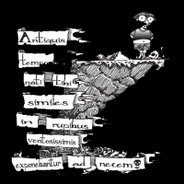Dissertation on Alan Moore

I realize I just posted, but I wanted to babble about something else. Pull up a chair. Let's talk about Alan Moore.
Recently, I've had an interesting and useful discussion about Alan Moore, and whether or not he's a literary genius (or just a comic book genius). I maintain that while his work can be thick, and sometimes difficult to get into, it's solid work that tells powerful stories, and that it should hardly be altered.
I think "dumbing down" Alan Moore would work about as well as those lousy "easy reader's versions" of people like Herman Melville and Victor Hugo. In other words, you've gutted it and then handed the carcass to people and expected them to appreciate it.
Personally, I don't have a problem when Hollywood "adapts" or makes over something. When I dislike a comic book based movie, people (friends and family included) always assume it's because I'm familiar with the original comic and it wasn't like that.
The thing is, I thus far have been familiar with the original material for most of the comic book movies, but that doesn't hold me back. Batman Begins, for example, wandered way away from most of the comics and I enjoyed it immensely, because it was well acted, well written, and it took itself seriously.
That's all I need. I don't care if its entirely faithful.
With Alan Moore's work, I go back and forth. I respect that he had his name taken off the film credits and had his share of the money split between the other co-creators. I was less than thrilled about the huge media stink that was made about it (none of which came from Alan himself, who is a quiet and sweet man). Alan Moore snubs Hollywood, hates Constantine! garbage like that.
I did not like LXG, because it was shallow and it acted silly. I disliked it for the same reason that I disliked the new Star Wars movies. I expected it to be changed and adapted, but not turned into a "teen titans, but with really old characters from books" sort of movie.
Inversely, I enjoyed V for Vendetta very much, even though it was written by the Wachowski Brothers, who have a less than sterling reputation for being able to write (Matrix 1: Good. Matrix 2, 3: Not so much.) I thought it was well done, powerfully acted and written, and gave me brilliant and moving performances by Natalie Portman, and Stephen Fry (he made me happy; he broke my heart).
From Hell was less than perfect. It had good moments, the ending not among them.
I enjoyed Constantine, though it had none of the depths or character that the comics had. It wasn't bad. It wasn't great either.
The nice thing about movies is, if the movie is good then it helps the book. If the movie sucks, then the book is untouched and unaffected.
Things like Watchman and Promethea would be nearly unfilmable, I think. I have no idea how you'd adapt them into movie form. His newest work, Lost Girls would be perfectly filmable, but would probably only show on Cinemax after midnight, when they show cheap softcore porn. (Although even then, it would be the most intelligent softcore porn movie ever made.)
There. Some chatter about Alan Moore. Go read his stuff, honestly. You'll enjoy it more than listening to me go on about it.
*PS: That picture up above is Alan Moore, big as a bear, standing beside the small, wonderful Jack Kirby. A picture like that is priceless.




2 comments:
Hey,
I was doing a search on "dissertation on Alan Moore" hoping for a PhD dissertation like I've heard written about Buffy. :)
Anyway, I'm fascinated by Moore and I'd say his work on Swamp Thing was personally transformative.
What do you think he is doing when he writes a story? What are his principles, themes--what's his goal? I'm trying to put into words what it is he does that makes me look at the world in such a different way after reading his stories.
Would love to hear your thoughts.
Ivan
Subscribing.
Post a Comment